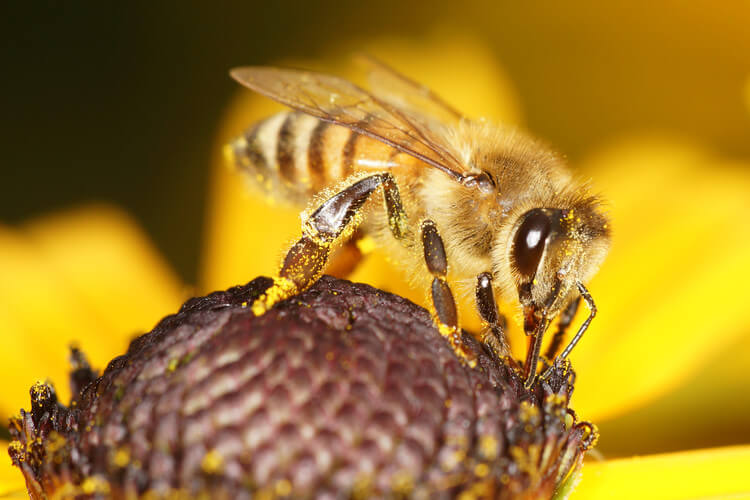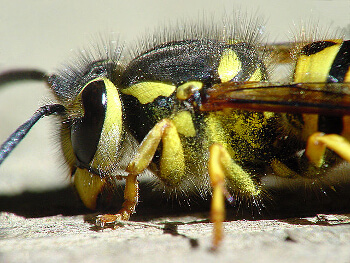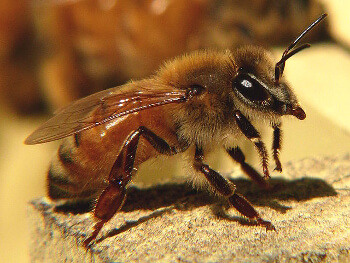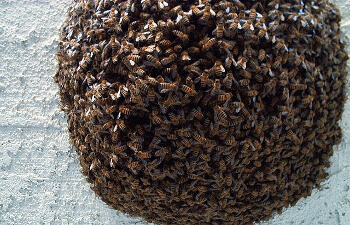Ricochet is the best place on the internet to discuss the issues of the day, either through commenting on posts or writing your own for our active and dynamic community in a fully moderated environment. In addition, the Ricochet Audio Network offers over 50 original podcasts with new episodes released every day.
 Ask the Expert: How I Learned to Stop Worrying and Love the Bees
Ask the Expert: How I Learned to Stop Worrying and Love the Bees

You’re afraid of this enterprising little lady? Seriously?
I should start this piece with a disclaimer: As far as beekeeping goes, I am a relative expert. This is only my second year of the hobby, which makes me a solid novice. However, beekeeping is an all-or-nothing commitment in that you either work with thousands of bees, or you don’t work with any. Most people fall into the latter category, so I can comfortably venture that — even as a novice — I’ve had more exposure to bees than most non-beekeepers will have in their lifetimes. On the other hand, I know that there is at least one other beekeeper on Ricochet, and she’s been at it about ten times as long as I. So, rather than focus on truly expert points, I will focus on points that a non-beekeper might find useful, specifically ones that show that honeybees, unlike wasps or hornets, aren’t all that scary.
Q: Aren’t honeybees aggressive like wasps or hornets?
A: Different strains have different levels of aggression, but on the whole, no. One of the most popular strains of honeybee is the Ligurian (or Italian), which is the strain of bees that the ancient Romans kept. It’s been domesticated for thousands of years and it shows.

Hi! I’m a Yellow Jacket. I’m a jerk.
Q: What does a honeybee look like, as opposed to a yellow jacket (wasp)?
A: Honeybees are smaller, browner, and are colored less brightly. Honeybees are also fuzzy; yellow jackets have some, but not a lot, of fuzz.
Q: If honeybees are not aggressive, why did one sting me?
A: If a honeybee stings, it is because it thinks that its life or its hive is threatened. Most people never come near a beehive, so the bee probably thought that its life was threatened. If a bee lands on you, don’t swat. Instead just watch, it will fly away on its own.
I have been stung only twice in two years and both times were my fault. The first time, there was a bee on the webbing of my thumb. I did not see it, closed my thumb, and squeezed the bee. The bee defended itself. The second time, I was inspecting the hive and one of the boxes fell to the ground. The bees thought, correctly, that their hive was threatened. So don’t threaten them, remain calm, and they most likely won’t sting you.
Q: Don’t honeybees die after they sting?
A: Yes, they do. Unlike wasps and hornets, honeybees have a barbed stinger: When used, the stinger is ripped out of its body and then it soon dies. So, unlike wasps and hornets, there is a cost for a honeybee to sting you. The honeybee instinctively knows this and will only sting if it thinks it must.

Hi! I’m a Honeybee. I’m fuzzy.
Q: Why do honeybees land on people?
A: Honeybees are foragers. They are looking for pollen, and sometimes they are looking for salt. Salt helps cure their honey. If a bee lands on you, it likely wants to lick off some salt and return to its hive. Not so threatening, right? If bees landing on you is a problem, buy a little salt wheel at a pet store and place it outside but protected from rain. The bees will eventually find it and begin to leave you alone.
Q: A honeybee landed on me and its stinger was twitching. That means that it was going to sting me, right?
A: No. What’s more, I think that this misunderstanding is the top reason why most people get stung by honeybees. Honeybees have a biology very different from that of mammals. Honeybees breathe through holes in their abdomens, which are sectioned and work like bellows. So when you see that a honeybee’s abdomen is pulsing, it’s merely breathing, not signaling aggression. So, don’t panic, don’t swat, and you won’t get stung.
Q: There are always bees around my swimming pool. Why?
A: Like every other living thing, bees need water. Check if there is an apiary nearby. If so, let the beekeeper know. He can set up an alternate water supply. Whether or not the bees will prefer the new supply over your pool is up to the bees.

Won’t you help the hiveless?
Q: There is a swarm of bees in my yard, What do I do?
A: First off, remain calm. Believe it or not, despite what over-hyped news stories or horror movies would have you think, honeybees are actually their most docile when swarming. Honeybees only swarm because their previous hive is no longer optimal. Usually, it is overpopulated. When they do swarm, they are looking for a new home. And since they have no home, they have no home to defend. And since they don’t want to set up a new home near threats, they will most likely avoid any threats. So, contact a local apiary. Honeybees are expensive. A beekeeper will gladly come out, adopt your swarm of no-cost bees, and remove them from your yard.
In just my short amount of time beekeeping, I can say that it is the most rewarding hobby I’ve taken up. Honeybees are very cool little creatures that you only begin to really appreciate once you start keeping them. The other reward is, of course, honey. Later today I will be prepping one of my hives for a harvest on Sunday. I expect to get about three gallons of wild sweet clover honey.
I am available for any beekeeping related questions you might have.
Are you a Ricochet member with an expertise of your own you’d like to share? See editor Tom Meyer’s post on how you can. Not a member? You can fix that here.
Published in Culture



At the moment, I have two. One is established (past its first year). One is starting (in its first year). Established hives produce more honey. I would estimate that the combined hives probably have between 30,000 to 40,000 bees.
First, unless you want to kill them, you never steal all of their food. Second, bees communicate with pheromones. When threatened they will release an alarm pheromone which other bees will propagate once they detect it. A smoker can is standard beekeeping equipment. The smoke blocks the reception of the alarm pheromone. So when the bees get agitated, you hit them with a little smoke and they calm down.
Third, these are honeybees, not wasps. If you move slowly, calmly, and deliberately, then you can inspect a lot of their hive without them getting aggressive.
Some people put a feeder on the hive with sugar water in it. I don’t do this. I leave plenty of honey for them to overwinter. I figure if you get too greedy then you get dead bees. I only put the feeder on in the early spring so they can get their yearly medications.
Beekeeping is actually the opposite of time intensive. The bees do all the work. You just need to check on them every once in a while to make sure that they are healthy. Although processing harvested honey takes some time. What I meant is that if you decide to keep bees, then resign yourself that “starting small” means dealing with 5,000 bees at a time.
I have one cat that goes to “inspect” the hive all the time. He gets stung and goes running into the house. Your cat will probably get stung a couple of times, but unless he tries to dig out the hive, the bees will probably leave him alone. Cats and other animals have a disadvantage over humans when it comes to bees. Cats smell like cats. Humans smell like soap. Bees don’t like animal smells. They perceive it as a potential threat. Bees also don’t like dark colors (think bears). Humans can put on light colored clothing, cats can not.
Absolutely. I’ve read stats that if you keep a flower or vegetable garden, then you can expect something like 40% greater yields just by having a beehive.
Thanks for the interesting article. I’d like to keep bees, unfortunately my girlfriend is deathly allergic.
Thanks Andy. I have a friend who makes cider and mead. I might start keeping a couple of hives at his place. He gets half the honey, I get half the mead. Maybe you might have a friend who would let you use his land too.
Thanks for the reply! This is interesting I’ve been reading more about bees suddenly. Not that I’d ever raise a colony ;)
How does one collect a roaming swarm of bees? Also does a split swarm have a queen? If not, did you let them produce one or buy a new one to take over?
Usually, a cardboard box, believe it or not.
Yes. If the hive gets overpopulated, the bees will convert some worker larvae into queen larvae. The new queens will hatch and one of the queens will take half of the hive to swarm and look for a new location to set up a new hive. I think the extra queens are probably killed by the remaining queen in the hive.
Creating new queens is intermediate to advanced beekeeping. I might try it late this year or early next year. Normally, if you see that the bees have made queen cells, you make sure that current queen is still alive. If she is, you clear out all of the queen cells so that the hive doesn’t swarm. If she’s not alive, you can either let the hive continue creating a new queen, or you can remove the cells and introduce a new queen that you’ve purchased.
You intentionally create new queens to split the hive yourself. That way, you can create new hives and not have to buy starter sets for each. This is a good way to handle an overpopulated hive.
Thanks, Rick! Could we see some pics some time of your hive and extraction equipment? The gadgetry has advanced since I messed around with it.
Is your wild clover white or red? Does red clover honey turn out darker than white clover honey?
It is Sweet Clover which is yellow. It grows wild in the grasslands of Wyoming and Colorado.
Yes. Last year, our one harvest was sweet clover honey. The honey was translucent. At the right of the picture, you’ll see a lit beeswax candle and then a half filled jar of honey. That jar shows best how translucent the honey was.
Also, honeybees will sort their pollen. When you inspect the hive, a frame of pollen is obvious. It is covered in multicolored cells.
https://wiggledanceforme.files.wordpress.com/2013/04/pollen.jpg
I’ll see what I can do.
Super, super photo! I’ve never seen anything like that.
No honey processing this weekend. The honey is still not ready. I will try again next weekend.
First, my sincerest thanks to Rick for such a great post.
Following up on this:
So, how much labor are we actually talking about? An hour a day? A week? I’ve no clue.
Cool stuff. Thanks. I had never heard that bees breathe through their abdomens! I didn’t know any animal did so.
A neighbor recently moved out to the country and started raising bees. He has a couple hives as well, but lost one to some sort of beetle invasion. What are the main threats in your area? Disease or pests?
Can you flavor your honey by introducing particular flowers to your garden? Or would your bees have to harvest from those flowers exclusively for it to make a difference?
How wide an area do your bees harvest from?
My friend has kept bees on Cape Cod for years and I’ve been the recipient of honey and bees wax, and I’ve learned a lot. I had no idea how important they are and how intelligent. Everyone has a job – the symmetrical beauty of the hive – the complete attention to the Queen – They do a dance in the air, fly in figure 8, but they are actually giving a map to other bees where to find water and flowers! I’ve seen them drink water from bird bath and even pools so I make a point to provide water. When my friend and her mom’s yields were down, they discovered it was due to local pesticide spraying. No pollinators, no fruits and vegetables.
What is so interesting is the different types of honey – I wonder how they only go to certain plants to make certain honey, just tried palmetto and it is similar to Tupelo. Also people with outdoor allergies can benefit by taking a spoonful of local honey each day to build resistance to local pollen. Good story – thank you!
We are flower gardeners and have always worked around honeybees in the flower beds without incident. We ignore them and they don’t bother us.
I have carpenter bees and bought a trap at a farm store which has caught about 2 dozen bees over a months time near my deck. I then made a copy of it to hang on my out building which has been somewhat successful, probably because the swarming time is about finished here. There are multiple videos of how to make various traps which all seem to work if the entry holes are angled upward and lead to a light source which confuses the bees.
https://www.youtube.com/watch?v=3RHtEOQj4yo
Thanks! I now have a better understanding of what my brother-in-law does with his spare time.
Remember how Sherlock Holmes was said to have retired to the country to keep bees? Well, Ian McKellen starred in the 2015 Mr. Holmes, in which bees and wasps feature prominently. The plot turns around their differences.
The first and classic analysis of bee dances was published in a sweet little 1971 book by Karl von Frisch: Bees – Their Vision, Chemical Senses, and Language.
Absolutely fascinating. Looking forward to the pictures of the golden harvest!
Thank you for reading, Tom.
For every hive you have, you want to check it every two to four weeks. Any more than that and the hive might think that they are constantly under threat and swarm away.
Each hive check takes, depending on the complexity of the hive, from ten to forty minutes. The check is a visual inspection of the hive. During the check you are looking specifically for the presence of a healthy queen. Seeing capped larva is good. Seeing uncapped larva is better. Seeing eggs (difficult, excellent eyesight required) is even better. Seeing the queen is best (difficult, thousands of bees). During this check, you also want to do some maintenance like swap bad hive parts (rare) or remove wax built outside of the frames (could encourage unwanted queen building and then swarming).
Processing a harvest of honey, however, is an all weekend affair. Once a hive is established (past its first year), I believe that you can expect two or more harvests of honey. I have a harvest almost ready. I will post pics and explanations to this thread.
Once a year, you also have to medicate the bees. That takes an hour or so.
So, like I said, the bees do most of the work.
My brother and I kept bees for about 10 years. He provided the expertise (he was a beekeeper in the Peace Corps) and I provided the location and assisted with the labor. At our peak we had nine hives and harvested 65 gallons of honey. At that level there is a time commitment which caused us to give it up.
Everything I know about beekeeping I learned from my brother. But I did learn some things from this post and thread. Thanks.
Exactly. Most people don’t know it and think that the bee is signalling aggression.
The main threats for my hives right now are ants, which are more of a nuisance than an actual threat. I saw some videos about ants not liking either diatomaceous earth or cinnamon. I will probably spread some of either or both around my hives soon.
Sure you can, but you’d have to have a lot of dedicated acreage for it to become a dominant flavor. I suppose if your palette is good, then you could pick out the flavor note. Either that or the plant/flower has to have a very strong taste. I just noticed yesterday, that our honey has a very faint taste of mint, probably due to our neighbor’s spearmint bush.
I live on the outskirts of Cheyenne, WY. So as far as they can go. I’m not really sure what the average roaming radius of a honeybees is.
My favorite is when a group of bees leave the hive for the first time. They do what is called an orientation flight. They fly all around the hive to get visual impressions of it from every possible angle. They do this to help them identify their hive when they fly back.
I believe what happens is large farms, like orange groves, will contract with a beekeeper. The beekeeper will deliver some hives to the grove. The bees will pollinate the orange blossoms, and return with the pollen. The honey produced is called orange blossom honey because the majority of the pollen can be expected to be from orange blossoms. Other than contracting, I think labeling is based on knowledge of the color of the honey and what was blooming at the time the honey was made.
I’ve heard this before as well. But, I’ve heard it should be local honey, because that will be made from local pollen.
Exactly. I tell people all the time, honeybees really don’t care about you, they are too focused on what they are doing.
You’re welcome. Thanks for reading. Ask to help him with an inspection some time. It’s interesting.
Thank you for the suggestions.